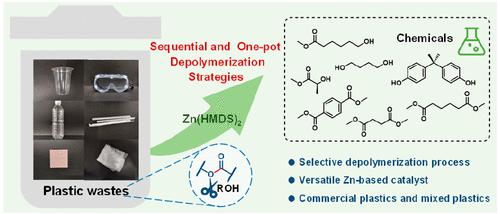当前位置:
X-MOL 学术
›
ACS Sustain. Chem. Eng.
›
论文详情
Our official English website, www.x-mol.net, welcomes your
feedback! (Note: you will need to create a separate account there.)
Selective, Sequential, and “One-Pot” Depolymerization Strategies for Chemical Recycling of Commercial Plastics and Mixed Plastics
ACS Sustainable Chemistry & Engineering ( IF 7.1 ) Pub Date : 2022-07-21 , DOI: 10.1021/acssuschemeng.2c01708 Rulin Yang 1, 2 , Guangqiang Xu 1, 2 , Bingzhe Dong 1, 2 , Xuanhua Guo 1 , Qinggang Wang 1, 2
ACS Sustainable Chemistry & Engineering ( IF 7.1 ) Pub Date : 2022-07-21 , DOI: 10.1021/acssuschemeng.2c01708 Rulin Yang 1, 2 , Guangqiang Xu 1, 2 , Bingzhe Dong 1, 2 , Xuanhua Guo 1 , Qinggang Wang 1, 2
Affiliation

|
The commercial plastics that are currently used in large-scale are primarily concerned with performance and durability, rather than degradability and recyclability. As a result, the chemical recycling of plastics becomes a significant challenge. Selective depolymerization of the mixed plastic waste is a promising solution to the challenges caused by plastic accumulation. Here we present sequential and “one-pot” depolymerization strategies for chemical recycling of commercial plastics (PLA, BPA-PC, PBS, PBAT, PCL, and PET) and mixed plastics (BPA-PC/PET, PLA/PBS, and PLA/PBAT) to their initial monomers or value-added chemicals. Taking advantage of the differences in depolymerization reactivity of commercial plastics and versatile catalytic degradation ability of zinc bis[bis(trimethylsilyl)amide] [Zn(HMDS)2], the selective depolymerization process was smoothly achieved under mild conditions. These strategies provide ideas for promoting the sustainable development of plastics that are currently being used in large-scale.
中文翻译:

商业塑料和混合塑料化学回收的选择性、顺序和“一锅”解聚策略
目前大规模使用的商业塑料主要关注的是性能和耐用性,而不是可降解性和可回收性。因此,塑料的化学回收成为一项重大挑战。混合塑料废物的选择性解聚是解决塑料积累带来的挑战的有希望的解决方案。在这里,我们介绍了商业塑料(PLA、BPA-PC、PBS、PBAT、PCL 和 PET)和混合塑料(BPA-PC/PET、PLA/PBS 和 PLA)化学回收的顺序和“一锅法”解聚策略/PBAT) 到它们的初始单体或增值化学品。利用商业塑料的解聚反应活性和双[双(三甲基甲硅烷基)氨基锌] [Zn(HMDS) 2的多种催化降解能力的差异],选择性解聚过程在温和条件下顺利实现。这些策略为促进目前大规模使用的塑料的可持续发展提供了思路。
更新日期:2022-07-21
中文翻译:

商业塑料和混合塑料化学回收的选择性、顺序和“一锅”解聚策略
目前大规模使用的商业塑料主要关注的是性能和耐用性,而不是可降解性和可回收性。因此,塑料的化学回收成为一项重大挑战。混合塑料废物的选择性解聚是解决塑料积累带来的挑战的有希望的解决方案。在这里,我们介绍了商业塑料(PLA、BPA-PC、PBS、PBAT、PCL 和 PET)和混合塑料(BPA-PC/PET、PLA/PBS 和 PLA)化学回收的顺序和“一锅法”解聚策略/PBAT) 到它们的初始单体或增值化学品。利用商业塑料的解聚反应活性和双[双(三甲基甲硅烷基)氨基锌] [Zn(HMDS) 2的多种催化降解能力的差异],选择性解聚过程在温和条件下顺利实现。这些策略为促进目前大规模使用的塑料的可持续发展提供了思路。































 京公网安备 11010802027423号
京公网安备 11010802027423号